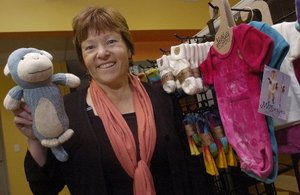Maggie's Organics in Ypsilanti earns first fair labor certification for apparel maker
For nearly 20 years, Maggie’s Organics in Ypsilanti has been among the nation’s top producers in organic apparel. With its spring line, Maggie’s hopes to extend its appeal with customers.
Maggie's has produced the first clothing collection in the world to obtain independent certification for Fair Labor Practices and Community Benefits. The certification means all levels of production for Maggie's spring line meet the global standards for fair labor.

Bena Burda, founder of Maggie's Organics in Ypsilanti's, helped her company achieve certification recognizing the company met fair labor standards.
File photo.
“First and foremost, it’s priced for the average customer to purchase,” said Maggie’s founder and CEO Bená Burda. “We try to make organic affordable. It’s well-designed, and customers love it.
“We try to do the right thing that’s alternative to traditional sweatshop models.”
The spring line includes camisoles, tanks, T-shirts, wrap tops, hoodies, wide leg pants, leggings knit dresses and scarves. Prices range from $12 to $35.
“Customers are very excited that there’s something like this,” said Maggie’s vice president Doug Wilson. “We can sleep at night knowing that everyone in the process has not only been treated fairly, but is making contributions to their community.”
The detailed certification process is monitored by Scientific Certification Systems, one of three organizations that verify fair labor practices. It required Maggie’s to identify each level of the apparel’s production from the organic cotton grower and cotton gin and spinning mill cooperatives in Nicaragua to the knitting and sewing factory in Costa Rica to the screen printing and office and warehouse operations in Michigan.
Burda accompanied the inspectors to each location, but had to sit out when it came time to interview management and workers.
“That process for me was a really big learning experience,” Burda said.
Certifications for fair labor or fair trade usually extend to commodities like bananas, coffee and tea, but Maggie’s becomes the first apparel company in the world to receive certification of this kind.
Burda hopes fair labor catches on with other apparel makers.
“We think this is ground breaking work, and the momentum behind the issues is driven by customers,” Burda said.
“Our customers care what goes in their body, and now what goes around their body. I think out of the concern for how food is grown is a greater concern for how a product is produced, so it’s a natural segue to ask how workers are treated.
“With the anti-sweatshop movement, this seems to be a natural fit.”
Brian Vernellis is a reporter for AnnArbor.com. He can be reached at 734-623-4617 or brianvernellis@annarbor.com.


Comments
TreeTownGal
Thu, Jul 8, 2010 : 11:26 a.m.
I am so happy for your works. This is not an easy step to get to - other mays not know but it is a lot of work to make sure the cotton that goes in and is sewn up in those cuddly clothes/toys are ensuring fair wages (growers, pickers, sewers). I love your products.
David Briegel
Thu, Jul 8, 2010 : 9:43 a.m.
Congratulations to a fine company on your notable achievement! Bena and Doug are fine members of their community!
Halima
Thu, Jul 8, 2010 : 8:50 a.m.
@John Alan - It is not economically feasible to grow cotton (organic or otherwise) in greenhouses in Michigan. Further, with Michigan's minimum wage at $7.40/hour and Costa Rica's minimum wage varying but approx. $3.00/hour for unskilled labor, it is not economically feasible to do any kind of mass textile production in this state. The only clothing commonly produced in Michigan is "boutique" or "designer" work, where the price point is high enough that minimum wage doesn't come into consideration.
John Alan
Thu, Jul 8, 2010 : 5:31 a.m.
I guess in this article they are addressing the concern about "anti-sweatshop movement" which is very good. But, may be instead of going to Nicaragua or Costa Rica they should consider bringing the whole operation to the US (hopfully Michigan) and help the economy of the state.